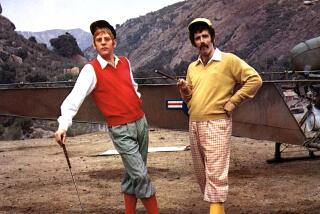MOVIE REVIEW : A Warm Look at a Counterculture Guru
- Share via
Allen Ginsberg is a great camera subject, but he’s mostly been a subject in documentaries about other people, like Jack Kerouac or William Burroughs. “The Life and Times of Allen Ginsberg,” directed by Jerry Aronson, redresses the balance. It’s a deeply affectionate portrait of the poet-guru, and the affection seems appropriate to Ginsberg’s becalmed, hypersensitive presence. The paradox of Ginsberg’s life, as the movie (at the Nuart) demonstrates, is how someone so gentle could still be a major countercultural force.
The gentility of the ‘60s countercultural warriors was often a pose--those flower-power types had stems of steel--but with Ginsberg the peace gestures and Buddhist chanting didn’t seem faked. Aronson had access to Ginsberg’s home movies and family photos from adolescence, and one can see the same languid, beseeching quality in the young wiry, bespectacled Ginsberg as in the Beat visionary and the later, bearded, love-beaded ‘60s guru.
The connection to all of these selves lies in Ginsberg’s poetry, and it’s to Aronson’s credit that he keeps the poetry front and center. We hear Ginsberg reading from “Howl,” perhaps the most famous of postwar American poems, and “Kaddish,” which was Ginsberg’s attempt to reclaim the shock of his mother’s anguish and lay it to rest.
His mother spent her later years in a sanitarium. As a child, Ginsberg, according to his stepmother, “saw more than any little boy should.” By his own admission, the pain of watching his mother’s breakdown preempted the pains that followed: Nothing could quite shatter him in the same way, and perhaps this helps to explain the unflappable, pacific way he rose up against the baton-wielding police during the 1968 Democratic Convention. Despite Ginsberg’s aestheticism, his confrontations with conservative orthodoxy were always based on political principles. If he’s a visionary, he’s a practical-minded one. He’s a political activist for the spirit.
Aronson spent 10 years putting together the footage for the film. Even though it’s only 83 minutes, it has an epic scope because Ginsberg’s life seems to take in the most highly charged history of the past 50 years. His progression from scrawny Columbia University student to Beat to hippie to Buddhist to Grand Old Man is a great American story. His homosexuality links him to a Whitmanesque tradition that he revels in. (This is one of the few current films where homosexual love is discussed without sniggering or special pleading.)
Is it also a bit too hero-worshippy toward Ginsberg? Perhaps, but the worshipfulness doesn’t seem out of place. Aronson recognizes that Ginsberg can’t be approached as a film subject in half-measures. When we see Ginsberg being interviewed by William Buckley in a ‘60s “Firing Line” show, the high comedy of the pairing gives way to something inexplicably touching. Buckley, eyebrow raised, lip curled, asks Ginsberg if “hippies are the new order,” and the poet replies by intoning one of his poems. As the words roll out, the sensual imagery takes hold and even Buckley seems entranced. Now that’s the power of art.
*
‘The Life and Times of Allen Ginsberg’
A First Run Features presentation. Director Jerry Aronson. Cinematographers Jean De Segonzoc, Roger Carter, Richard Lerner. Editor Nathaniel Dorsky. Music Tom Capek. Sound Lori Loeb, Michael Harrison, Erik Houseman, Greg Poschman. Running time: 1 hour, 23 minutes.
MPAA unrated. Times guidelines: It includes frank discussion of drug usage and homosexuality.
More to Read
Only good movies
Get the Indie Focus newsletter, Mark Olsen's weekly guide to the world of cinema.
You may occasionally receive promotional content from the Los Angeles Times.









